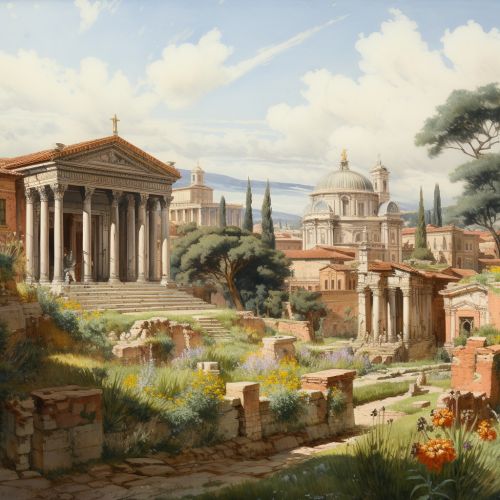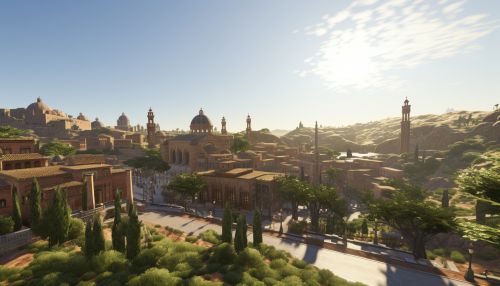Roman Republic
Origins and founding
The Roman Republic was a period of ancient Roman civilization that began with the overthrow of the Roman Kingdom, traditionally dated to 509 BC, and ended in 27 BC with the establishment of the Roman Empire. It was during this period that Rome's control expanded from the city's immediate surroundings to hegemony over the entire Mediterranean world.
Political structure
The Roman Republic was characterized by a complex constitution, which centered on the principles of a separation of powers and checks and balances. The evolution of the constitution was heavily influenced by the struggle between the patricians, Rome's land-holding aristocracy, who traced their ancestry back to the early history of the Roman kingdom, and the plebeians, the common populace. The constitution of the Roman Republic was a set of guidelines and principles passed down, mainly through precedent.
The Senate
The Roman Senate was a political institution in the ancient Roman Republic. It was not an elected body, but one whose members were appointed by the consuls, and later by the censors. After a Roman magistrate served his term in office, it usually was followed with automatic appointment to the Senate. According to the Greek historian Polybius, our principal source on the Constitution of the Roman Republic, the Roman Senate was the predominant branch of government.
The Assemblies
The citizens of Rome were organized into a complex system of assemblies. The Centuriate Assembly was the assembly of the soldiers in Rome. It was organized by classes based on wealth, and its purpose was to elect the consuls and the praetors. The Tribal Assembly was a non-military assembly organized by tribe, and its purpose was to elect the quaestors and the curule aediles.
The Magistrates
In the Roman Republic, a magistrate was an elected official with various duties and powers. The two most powerful magistrates were the consuls, who were elected for a one-year term by the Centuriate Assembly. The consuls presided over the Senate and the Assemblies, and had wide-ranging powers of state, including the power to wage war, spend the public money, and execute citizens.
Society and culture
Roman society was patriarchal in the purest sense; the male head of household was the pater familias, he held power over life and death for those living in his household. Roman law was thus a reflection of the social norms and customs of the time, and the patriarchal tendency is particularly evident in the laws relating to marriage and the paterfamilias.
Religion
Roman religion was highly practical and contractual, based on the principle of do ut des, "I give that you might give". Religion depended on knowledge and the correct practice of prayer, ritual, and sacrifice, not on faith or dogma, although Latin literature preserves learned speculation on the nature of the divine and its relation to human affairs.
Education
Education in the Roman Republic was not considered a public duty or public service, but was entirely left to the private sphere. Formal education was available for those families who could afford it, and tutors were often slaves or freedmen. The curriculum was based on the study of grammar and rhetoric, and later included the study of law and philosophy.
Military
The military of the Roman Republic was a complex and highly efficient fighting force, which helped Rome to expand its territory and maintain its empire. The Roman military was split into the Roman legions and the Roman navy. The Roman legions were the ultimate military force of the ancient world, and were composed of citizen-soldiers who provided their own equipment and fought without pay, in return for a share of the spoils of war.
Decline and fall
The fall of the Roman Republic is a subject that has been treated by many historians. The exact causes and timing of the Republic's fall are subjects of ongoing debate among historians. Some argue that the fall was a consequence of military dictatorship and the rise of charismatic leaders, while others argue that the fall was a result of the economic instability and the gap between the rich and the poor.


